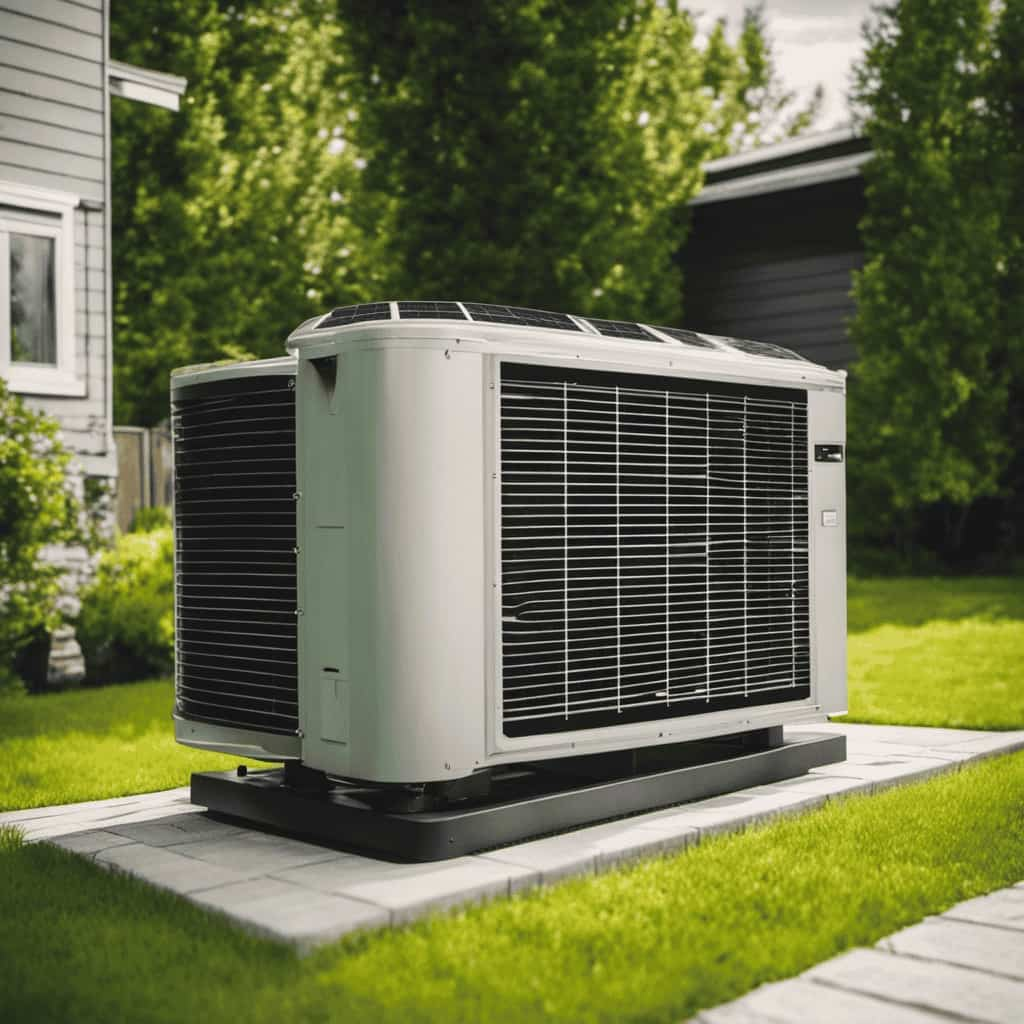We are here to uncover the secrets of efficiency by comparing heat pumps to conventional heaters. Come with us as we explore the realm of heat pump technology, discovering how it can help you save energy, cut costs, and benefit the environment.
We’ll guide you through the factors to consider when choosing between these options, ensuring you make an informed decision that serves your needs.
Get ready to decode efficiency like never before!
Key Takeaways
- Heat pumps provide both heating and cooling for homes and businesses, making them versatile and cost-effective.
- Heat pumps have high efficiency due to heat transfer instead of heat generation, while traditional heating systems may have lower efficiency ratings due to fuel burning.
- Heat pumps consume less energy compared to traditional heating systems and can produce up to three times more energy than they consume.
- Heat pumps reduce greenhouse gas emissions and carbon footprint by using electricity instead of burning fossil fuels, promoting sustainability and improving air quality.
The Basics: Understanding Heat Pump Technology
Let’s start by exploring the fundamentals of heat pump technology.

Heat pumps are efficient heating and cooling systems that work by transferring heat from one place to another. They’re designed to provide both heating and cooling for homes and businesses, making them versatile and cost-effective.
When it comes to heat pump installation, it’s important to hire professionals who’ve the expertise and knowledge to ensure a proper and efficient installation.
Regular heat pump maintenance is also crucial to keep the system running smoothly and efficiently. This includes cleaning or replacing filters, checking refrigerant levels, and inspecting the overall performance of the system.
Efficiency Factors: Comparing Heat Pumps and Traditional Heating Systems
One important factor to consider when comparing heat pumps and traditional heating systems is the efficiency ratings. Efficiency comparison and performance analysis are crucial in determining which system is more cost-effective and environmentally friendly.

Heat pumps are known for their high efficiency, as they transfer heat from one place to another instead of generating it. This means they can provide more heat for less energy consumption compared to traditional heaters.
On the other hand, traditional heating systems, such as furnaces, may have lower efficiency ratings because they generate heat by burning fuel.
Energy Savings: How Heat Pumps Can Reduce Your Heating Costs
The use of heat pumps can significantly reduce our heating costs by maximizing energy efficiency. Heat pumps are designed to transfer heat from one place to another, rather than generating heat themselves. This means they consume less energy compared to traditional heating systems, resulting in substantial cost savings.
By using the ambient heat from the air, ground, or water, heat pumps can produce up to three times more energy than they consume. This increased energy efficiency directly translates into lower heating costs for homeowners and businesses alike. With rising energy prices, investing in a heat pump can provide long-term savings and help us better manage our heating expenses.

In addition to the financial benefits, heat pumps also have a positive environmental impact. Let’s explore how heat pumps contribute to a more eco-friendly future in the next section.
Environmental Impact: Heat Pumps and Their Eco-Friendly Advantage
By reducing greenhouse gas emissions and minimizing our carbon footprint, heat pumps offer an eco-friendly advantage over traditional heaters. Heat pumps are designed with eco-friendly features that make them a more sustainable choice for heating our homes. Unlike traditional heaters that burn fossil fuels, heat pumps use electricity to transfer heat from one place to another, making them more energy-efficient and environmentally friendly. This not only helps to reduce our reliance on non-renewable energy sources but also lowers our carbon emissions. Additionally, heat pumps do not produce any direct emissions, such as carbon monoxide or nitrogen oxides, which can be harmful to both human health and the environment. Overall, by choosing heat pumps, we can make a positive impact on the environment by reducing our carbon footprint and contributing to a greener future.
| Eco-Friendly Features | Benefits |
|---|---|
| Energy-efficient | Reduces energy consumption and lowers greenhouse gas emissions |
| Uses renewable energy sources | Decreases reliance on fossil fuels and promotes sustainability |
| No direct emissions | Improves air quality and reduces harmful pollutants |
| Long lifespan | Reduces waste and the need for frequent replacements |
| Can be powered by solar energy | Further reduces environmental impact and reliance on the grid |
Considerations for Choosing: Factors to Evaluate When Deciding Between Heat Pumps and Traditional Heaters
When deciding between heat pumps and traditional heaters, it’s important to consider factors such as energy efficiency, cost, and compatibility with existing infrastructure.
Here are some key considerations to evaluate when making your decision:

-
Energy Efficiency: Heat pumps are known for their high energy efficiency, as they can transfer heat rather than generate it. This can lead to significant energy savings and lower utility bills.
-
Cost Comparison: While heat pumps may have a higher upfront cost compared to traditional heaters, their energy efficiency can result in long-term cost savings. Consider the lifecycle cost of each option.
-
Installation Requirements: Heat pumps require professional installation, as they involve complex electrical and refrigerant systems. Traditional heaters, on the other hand, are typically easier and less expensive to install.
-
Existing Infrastructure: Take into account the compatibility of your existing infrastructure with heat pumps. Upgrading to a heat pump may require modifications to your electrical system or ductwork.

-
Climate Considerations: Heat pumps work best in moderate climates, as they extract heat from the outside air. In colder climates, supplemental heating may be needed.
Frequently Asked Questions
Can Heat Pumps Be Used for Both Heating and Cooling?
Yes, heat pumps can be used for both heating and cooling. They offer advantages such as energy efficiency compared to traditional heaters, but there may be some disadvantages to consider as well.
What Is the Average Lifespan of a Heat Pump Compared to a Traditional Heater?
The average lifespan of a heat pump compared to a traditional heater varies, but heat pumps generally last longer. Additionally, heat pumps are more energy efficient, making them a beneficial choice for serving others.
Do Heat Pumps Require Regular Maintenance and Servicing?
Yes, heat pumps require regular maintenance and servicing to ensure optimal performance. We recommend scheduling annual check-ups and filter replacements to keep your heat pump running efficiently and prolong its lifespan.

Are Heat Pumps Suitable for All Types of Homes and Climates?
Heat pumps can be a suitable option for many homes and climates. They are energy efficient in various climates and can be cost-effective for different types of homes. Regular maintenance is important for optimal performance.
Are There Any Government Incentives or Rebates Available for Installing a Heat Pump?
Yes, there are government incentives and rebates available for installing a heat pump. These incentives can help offset the cost of installation and encourage energy savings, making it a win-win for homeowners.
Conclusion
In the battle between heat pumps and traditional heaters, it’s clear that heat pumps are the champions of efficiency. They not only save you money on heating costs, but they also have a smaller environmental footprint.
Choosing a heat pump is like embracing a warm hug from Mother Nature herself, while traditional heaters are like burning money and harming the planet.

It’s time to make the switch and join the eco-friendly revolution.









